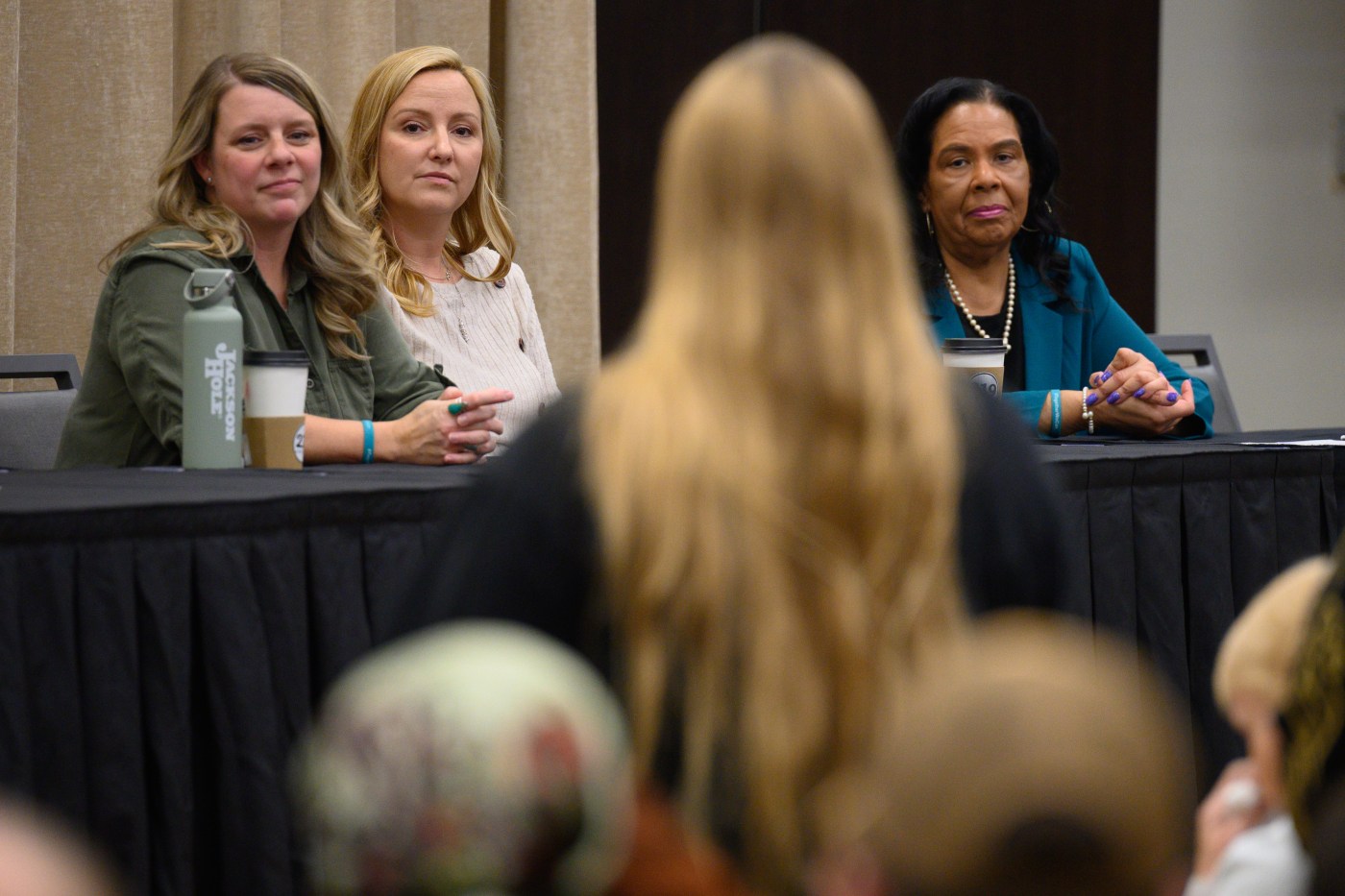Gabby Petito’s grieving parents are working tirelessly to protect others from the domestic violence that claimed their daughter’s life. They want people to recognize the red flags — warning signs they only understood in hindsight.
Petito’s mother, Nicole Schmidt, and “bonus mother,” Tara Petito, spoke to a large crowd Monday at Purdue University Northwest’s Hammond campus in recognition of Domestic Violence Awareness Month.
Gabby Petito, 22, died on August 27, 2021, in Bridger-Teton National Forest in Wyoming during a vacation with her fiancé, Brian Laundrie, who was suspected in her killing. Gabby died of strangulation and blunt force trauma.
An FBI investigation determined Laundrie was the killer. His remains were found later that year. A forensic anthropologist concluded he died of a self-inflicted gunshot wound.
The story made headlines across the country and later became the subject of a Netflix documentary.
Since Gabby’s death, her four parents — with Tara Petito preferring the term “bonus mother” over stepmother — have been working hard to raise awareness, advocate for legislation, and connect people to resources for missing persons and domestic violence.
“It’s healing for us,” Schmidt said.
Through the Gabby Petito Foundation and their ongoing advocacy, including numerous personal appearances, Schmidt and Petito have heard from women who say they were helped because of Gabby’s example and the lessons learned from her story.
### Remembering Gabby as a Person
Gabby’s story starts with who she was growing up. “It’s important to remember her as a person and not just as a victim,” Schmidt said.
“She could light up the entire room no matter where she was going,” Petito added.
An amazing artist, Gabby could draw her self-portrait to perfection. She would spread her artwork across the large kitchen island, with color pencils everywhere.
Gabby was so talented that Schmidt bought her a tattoo gun, which she quickly used on her brother — the only person to have one of her tattoos.
“What we have right now is pictures,” Petito said. “Take as many pictures with your loved ones, go on vacations, live life.”
Families should have traditions to honor loved ones like Gabby to keep their memories alive. “Talk about them,” Schmidt encouraged.
“For Thanksgiving, I will leave an empty seat open for her,” Petito said. “She was tiny, but she could eat,” Schmidt added.
In Gabby’s memory, her family has released butterflies and painted rocks with positive messages, including leaving some in Wyoming.
### When Brian Laundrie Entered the Picture
When Laundrie came into Gabby’s life, he fooled everyone at first.
“When I first met Brian, I really liked him,” Petito said. He acted respectful to Gabby and her parents.
Schmidt agreed. However, over time, Petito’s feelings shifted. “I kind of shifted, but I think everybody else really liked him.”
There were signs of concern, but Schmidt and Petito didn’t recognize them at the time.
“It’s hard when the person in it doesn’t see it — the people around you miss it,” Schmidt said. “I always thought abuse was hitting,” Petito added, “but there are other forms, including emotional abuse. You don’t know what you don’t know. That’s why we’re here.”
Brian was definitely a love bomber, Schmidt said. “He was always buying her things she didn’t need.” Schmidt told him he didn’t need to buy Gabby things for her to like him, but he later used that against Gabby, implying she should be more grateful because of what he “invested” in her.
Petito also cosigned a car for Gabby, but when Gabby stopped making payments, Petito wondered why Laundrie didn’t help her.
About a week before Gabby died, Petito had a bad gut feeling and began to question Laundrie’s character.
“We didn’t see any indication that she was in any kind of danger,” Schmidt said.
Isolation was another red flag they missed. Their first vacation together was before they started dating.
“He was isolating her right from the beginning,” Petito said. She noticed behavioral changes early on.
“Most kids do not open up to their parents,” Petito said, but she encourages open communication with their other children. She advises that if a child doesn’t feel comfortable talking to a parent, they should know another trusted adult, like a teacher, to confide in.
### Moving Closer, But Losing Touch
When Gabby became distant, Petito and her husband, Gabby’s biological father, sold their home in New York and moved to Florida to be closer to her.
However, when they arrived, Gabby had left on her fatal second vacation without letting Petito know.
“I think she hid the second trip from me,” Petito said. “I was super excited the first time they went.”
Gabby had told Schmidt she and Laundrie planned to get a van to renovate and travel the United States for about a year. But six months later, they left on that trip without waiting to finish.
Schmidt believes the move to Florida was Laundrie’s way of isolating Gabby from her support system.
“I think that best friend would have been a great line of communication,” she said.
One concerning text during that trip mentioned they were heading to Yosemite National Park and to expect little communication due to poor cell service, but Schmidt was told they were going to the Grand Tetons.
### Reporting Gabby Missing and the Search
It took three days to report Gabby missing. Petito explained that in Utah, where one reports a missing person depends on where they live, while in Florida, it’s based on the person’s last known location.
Gabby’s father kept making calls until finally a police officer in New York reported her missing.
Finding Gabby’s remains took even longer. Her body was discovered on September 19, 2021 — about three weeks after her death.
“On September 19, we had the worst phone call of our life,” Schmidt recalls. “I remember just dropping to the floor.”
Schmidt called the kids inside and told them they had found their sister. “Everybody just cried.”
“They knew Gabby was missing,” Petito said.
Gabby’s father was doing interviews from early morning to late night. A trusted friend and attorney scheduled media tours to raise awareness while Gabby was still missing.
From Florida to Wyoming is a vast area to search for a missing adult, Petito said.
“I think all of us deep down inside knew what really happened,” she said, “but we were still in shock. We cried a lot, really cried a lot.”
“That’s why we fight so hard, so other families don’t have to go through this,” Petito said.
### The Importance of Police Training in Domestic Violence Cases
Body camera footage from a domestic violence call in Moab, Utah, weeks before Gabby died, offers important lessons, Schmidt said.
Contrary to what one might expect, the aggressor is often the calm person when police arrive. The victim tends to act erratically.
In this case, Gabby was the one acting erratically, but police treated her as the aggressor and took Laundrie to a hotel to separate the couple overnight.
“I have watched that video probably 50 to 100 times now, and I see something new each time,” Schmidt said.
Schmidt and Petito are working to train police to recognize that domestic violence cases often involve a pattern leading up to the incident they respond to. It’s not just about the single day’s event.
Gabby should have been connected to a victim’s advocate who could have helped her, Schmidt said.
They encourage police departments nationally to use the Moab video in training to better respond to domestic violence cases.
### Legislative Efforts
State Representative Maureen Bauer, D-South Bend, plans to reintroduce the Gabby Petito Bill next year.
The bill would require law enforcement to assess potential lethality when responding to domestic violence cases.
Dispatchers would ask callers whether the aggressor has a gun, has choked or threatened to choke the victim, whether the victim has children from someone besides the aggressor, and other key questions.
This way, officers would have a clearer understanding of the situation they might be facing.
The South Bend and St. Joseph County police departments already perform these lethality assessments. Some departments, including Valparaiso, Portage, and Porter County, employ social workers to follow up on domestic violence cases and assist victims beyond just the immediate police response.
### Domestic Violence Awareness and Prevention
“We do know about three women die every day as a result of domestic violence,” said PNW Professor Nicky Ali Jackson, who heads the Center for Justice and Exoneration Network.
The center, along with PNW’s College of Humanities, Education and Social Sciences and the psychology and behavioral sciences departments, sponsored the event.
“The reality is Gabby was strangled. That’s how she was murdered,” Petito said.
“Even for fun, putting hands around someone’s neck is wrong. When somebody puts their hands around your neck, you’re 750% more likely to be killed,” she emphasized.
### Resources and Advice for Those at Risk
Schmidt and Petito answered many questions from students and community members.
If you’re at risk of harm, the Gabby Petito Foundation’s website lists available resources. You can also call a domestic violence hotline.
They recommend using a private browser window when searching for help online to avoid leaving any trace that could alert the aggressor.
Confiding in a trusted friend or calling a hotline are critical steps.
If you’re a friend of someone at risk, ask how they’re doing and if they’re okay.
Keep the conversation going if you suspect your friend may be in danger, but remember to protect your own mental health.
“If you feel a loved one going through something, do not isolate them more by talking bad about their partner,” Petito said. “Keep that open line of communication as much as possible.”
### Final Thoughts
Domestic violence affects families, communities, and the country as a whole, Schmidt said. “It’s just connected to everything.”
She urged everyone to set boundaries and prioritize safety.
—
*Doug Ross is a freelance reporter for the Post-Tribune.*
https://www.chicagotribune.com/2025/10/20/heed-red-flags-in-wake-of-gabby-petitos-murder-mothers-say/


